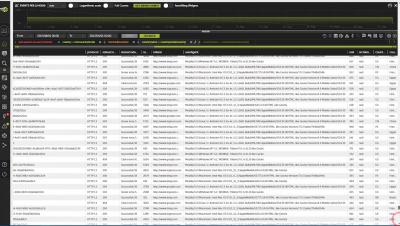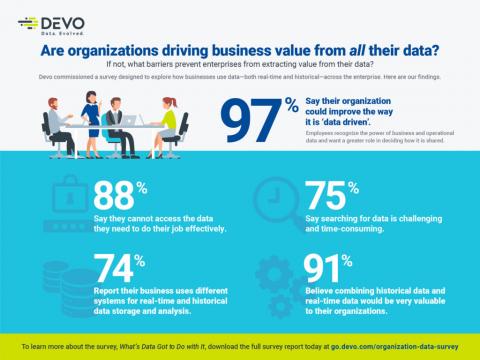Security | Threat Detection | Cyberattacks | DevSecOps | Compliance
Analytics
Devo Selected to the "GSMA 100"
5 September 2018, Cambridge, Mass: Devo Technology today announced that it has been named one of the first companies in the “GSMA 100,” a global innovation discovery initiative developed by the GSMA to identify and advance the next generation of connectivity and digital services.
How To Fix 5 Common Elasticsearch Issues
What's Data Got to Do with It? A Lot, Says Survey
Data drives us at Devo—and although most organizations would benefit from a more data-driven approach, recent research shows organizations are grappling with the challenges of accessing and using operational data for business benefit. Data volumes are continuing to grow, fueled by machine data from a multitude of sources. But there is often a significant gap between the volume of data collected and the operational benefits that can be gained from that data.
In-house v. Cloud-based Log Management
Data generated by various devices connected in a network and operations being carried out on them is called as log data and we have already discussed why log management is important, considering the exponentially increasing number of attacks and their sophistication. Further, in the last blog post, we dealt with questions that you must your cloud-based log management service provider.
How Can Logs Be Useful?
From performance information to fault and intrusion detection, logs can provide you a lot more things with regard to what is happening on your systems and network along with the timestamps and order of the events. Logs can be invaluable for resource management, instruction detection, and troubleshooting. More importantly, logs can provide an admissible evidence for forensic purposes in the aftermath of an incident. The following sections provide a deep dive into some use-cases of logs.
CaixaBank Accelerates and Secures Digital Transformation with Devo
Cambridge, MA, August 1, 2018 – Devo Technology, formerly Logtrust, today announced that CaixaBank, a leader in retail banking in Spain, is using the Devo Data Operations Platform to secure its Digital Transformation efforts.
Autonomous cars: Data will drive the future
You might have not noticed it, but we are on the verge of a disruptive change in the way we humans transport ourselves. In the next five to ten years the way we think about – and take – our daily commute, our holiday vacation, trips to the market – anything that involves transport over a distance too great to walk – will dramatically change.
Questions You Should Ask Your Cloud-Based Log Management Service Provider
The log management service is often outsourced to a third-party service provider due to the complexity of the process involved in the collection of logs. When a business plans for outsourcing log management to a service provider, business requirements must be given a top-most priority. To start with, a business must identify the goals it desires to accomplish through log management. After locating the required resources, the decision-making body should select a vendor for availing its services.
Why Is Logging Ecosystem So Important?
The logging ecosystem or a logging infrastructure is the set of all components and parts that work together to generate, filter, normalize, and store log messages. The purpose of this logging system is to use logs for solving particular problems. For example, the logs can help to find out the source of the attack. This article defines each component of logging ecosystem and illustrates how they work.








